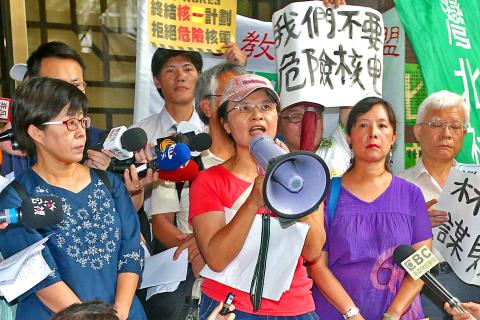Campaigners against nuclear energy yesterday filed a lawsuit against Premier Lin Chuan (林全) over his idea of reactivating Jinshan Nuclear Power Plant’s No. 1 reactor amid safety fears over the aging reactor.
Lin was accused of endangering public safety with his remarks on Sunday that he might permit the restart of the reactor at the plant in New Taipei City’s Shimen District (石門), which has been shut for nearly 18 months, to ease the nation’s power shortages.
It is the second lawsuit against officials who have suggested restart the reactor; Minister of Economic Affairs Lee Chih-kung (李世光) and Atomic Energy Council Minister Hsieh Shou-shing (謝曉星) were sued on Monday last week.

Photo: CNA
Veteran campaigner Lin Jui-chu (林瑞珠) said that the reactor is the most dangerous nuclear facility in the world because there are used fuel rods that are unable to be retrieved from the reactor, and there is no precedent for reusing spent fuel rods.
Campaigners say that power shortages are not enough of a reason to restart the reactor.
“There is no power shortage in Taiwan. Taiwan Power Co’s [Taipower] total generation capacity is 48,000 megawatts, but the nation consumes 35,000 megawatts. That means about 28 percent of the capacity has not been tapped, because Taipower either allows power plants to undergo maintenance or run at lower capacity,” Mom Loves Taiwan secretary-general Yang Shun-mei (楊順美) said.
“How can we allow that 28 percent capacity to remain unused, Yang said.
Lin’s move is abusing the Executive Yuan’s authority and reneging on the party’s promise of going nuclear-free by 2025, Green Consumers’ Foundation chairman Jay Fang (方儉) said.
Taipower has denied allegations that it does not fully utilize its facilities, saying it was operating at a margin of 1.64 percent on Tuesday last week — the lowest operating margin in 10 years.
Excluding the 7,000 megawatt generation capacity of the private sector over which the company has no control, Taipower has only a capacity of 41,000 megawatts, but that does not equal to actual power generation capacity, which is restricted by environmental protection issues, maintenance and weather.
“Accusations that Taipower creates an impression of power shortage risk are not true,” the company said.

Alain Robert, known as the "French Spider-Man," praised Alex Honnold as exceptionally well-prepared after the US climber completed a free solo ascent of Taipei 101 yesterday. Robert said Honnold's ascent of the 508m-tall skyscraper in just more than one-and-a-half hours without using safety ropes or equipment was a remarkable achievement. "This is my life," he said in an interview conducted in French, adding that he liked the feeling of being "on the edge of danger." The 63-year-old Frenchman climbed Taipei 101 using ropes in December 2004, taking about four hours to reach the top. On a one-to-10 scale of difficulty, Robert said Taipei 101

Nipah virus infection is to be officially listed as a category 5 notifiable infectious disease in Taiwan in March, while clinical treatment guidelines are being formulated, the Centers for Disease Control (CDC) said yesterday. With Nipah infections being reported in other countries and considering its relatively high fatality rate, the centers on Jan. 16 announced that it would be listed as a notifiable infectious disease to bolster the nation’s systematic early warning system and increase public awareness, the CDC said. Bangladesh reported four fatal cases last year in separate districts, with three linked to raw date palm sap consumption, CDC Epidemic Intelligence

Two Taiwanese prosecutors were questioned by Chinese security personnel at their hotel during a trip to China’s Henan Province this month, the Mainland Affairs Council (MAC) said yesterday. The officers had personal information on the prosecutors, including “when they were assigned to their posts, their work locations and job titles,” MAC Deputy Minister and spokesman Liang Wen-chieh (梁文傑) said. On top of asking about their agencies and positions, the officers also questioned the prosecutors about the Cross-Strait Joint Crime-Fighting and Judicial Mutual Assistance Agreement, a pact that serves as the framework for Taiwan-China cooperation on combating crime and providing judicial assistance, Liang

US climber Alex Honnold left Taiwan this morning a day after completing a free-solo ascent of Taipei 101, a feat that drew cheers from onlookers and gained widespread international attention. Honnold yesterday scaled the 101-story skyscraper without a rope or safety harness. The climb — the highest urban free-solo ascent ever attempted — took just more than 90 minutes and was streamed live on Netflix. It was covered by major international news outlets including CNN, the New York Times, the Guardian and the Wall Street Journal. As Honnold prepared to leave Taiwan today, he attracted a crowd when he and his wife, Sanni,